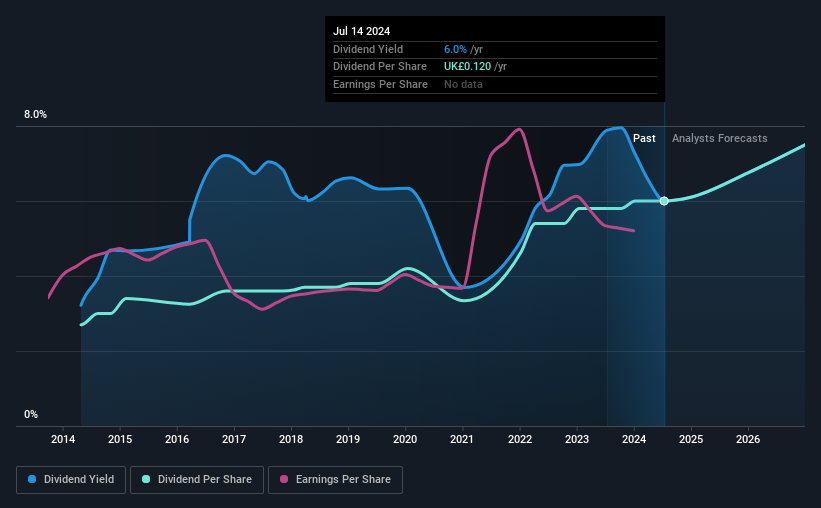It Might Not Be A Great Idea To Buy M Winkworth PLC (LON:WINK) For Its Next Dividend
Some investors rely on dividends for growing their wealth, and if you're one of those dividend sleuths, you might be intrigued to know that M Winkworth PLC (LON:WINK) is about to go ex-dividend in just three days. Typically, the ex-dividend date is one business day before the record date which is the date on which a company determines the shareholders eligible to receive a dividend. It is important to be aware of the ex-dividend date because any trade on the stock needs to have been settled on or before the record date. Meaning, you will need to purchase M Winkworth's shares before the 18th of July to receive the dividend, which will be paid on the 14th of August.
The company's next dividend payment will be UK£0.03 per share, and in the last 12 months, the company paid a total of UK£0.12 per share. Looking at the last 12 months of distributions, M Winkworth has a trailing yield of approximately 6.0% on its current stock price of UK£2.00. Dividends are a major contributor to investment returns for long term holders, but only if the dividend continues to be paid. We need to see whether the dividend is covered by earnings and if it's growing.
View our latest analysis for M Winkworth
Dividends are typically paid from company earnings. If a company pays more in dividends than it earned in profit, then the dividend could be unsustainable. Its dividend payout ratio is 90% of profit, which means the company is paying out a majority of its earnings. The relatively limited profit reinvestment could slow the rate of future earnings growth. It could become a concern if earnings started to decline. A useful secondary check can be to evaluate whether M Winkworth generated enough free cash flow to afford its dividend. Over the past year it paid out 132% of its free cash flow as dividends, which is uncomfortably high. It's hard to consistently pay out more cash than you generate without either borrowing or using company cash, so we'd wonder how the company justifies this payout level.
M Winkworth does have a large net cash position on the balance sheet, which could fund large dividends for a time, if the company so chose. Still, smart investors know that it is better to assess dividends relative to the cash and profit generated by the business. Paying dividends out of cash on the balance sheet is not long-term sustainable.
While M Winkworth's dividends were covered by the company's reported profits, cash is somewhat more important, so it's not great to see that the company didn't generate enough cash to pay its dividend. Were this to happen repeatedly, this would be a risk to M Winkworth's ability to maintain its dividend.
Click here to see how much of its profit M Winkworth paid out over the last 12 months.
Have Earnings And Dividends Been Growing?
Businesses with strong growth prospects usually make the best dividend payers, because it's easier to grow dividends when earnings per share are improving. Investors love dividends, so if earnings fall and the dividend is reduced, expect a stock to be sold off heavily at the same time. With that in mind, we're encouraged by the steady growth at M Winkworth, with earnings per share up 7.2% on average over the last five years. Earnings have been growing at a steady rate, but we're concerned dividend payments consumed most of the company's cash flow over the past year.
Many investors will assess a company's dividend performance by evaluating how much the dividend payments have changed over time. In the last 10 years, M Winkworth has lifted its dividend by approximately 8.3% a year on average. We're glad to see dividends rising alongside earnings over a number of years, which may be a sign the company intends to share the growth with shareholders.
The Bottom Line
Is M Winkworth worth buying for its dividend? M Winkworth is paying out a reasonable percentage of its income and an uncomfortably high 132% of its cash flow as dividends. At least earnings per share have been growing steadily. Overall it doesn't look like the most suitable dividend stock for a long-term buy and hold investor.
With that in mind though, if the poor dividend characteristics of M Winkworth don't faze you, it's worth being mindful of the risks involved with this business. To help with this, we've discovered 3 warning signs for M Winkworth (1 is significant!) that you ought to be aware of before buying the shares.
If you're in the market for strong dividend payers, we recommend checking our selection of top dividend stocks.
Have feedback on this article? Concerned about the content? Get in touch with us directly. Alternatively, email editorial-team (at) simplywallst.com.
This article by Simply Wall St is general in nature. We provide commentary based on historical data and analyst forecasts only using an unbiased methodology and our articles are not intended to be financial advice. It does not constitute a recommendation to buy or sell any stock, and does not take account of your objectives, or your financial situation. We aim to bring you long-term focused analysis driven by fundamental data. Note that our analysis may not factor in the latest price-sensitive company announcements or qualitative material. Simply Wall St has no position in any stocks mentioned.
Have feedback on this article? Concerned about the content? Get in touch with us directly. Alternatively, email editorial-team@simplywallst.com

 Yahoo Finance
Yahoo Finance 
